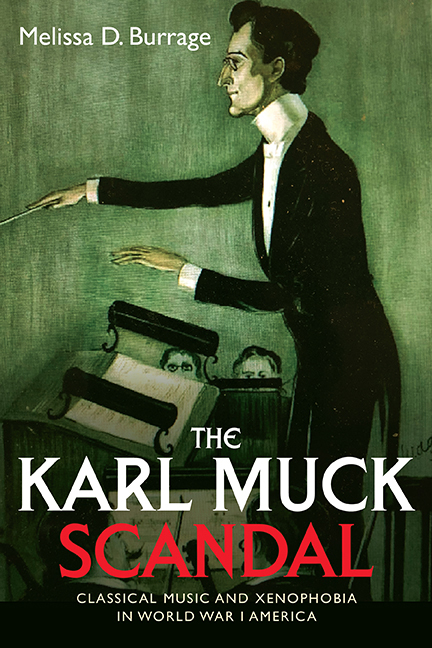Book contents
- Frontmatter
- Dedication
- Contents
- Introduction
- 1 Here on Foreign Shores: Dr. Karl Muck's Acclaim in Boston (1906–1918)
- 2 Mobilization: A Changing Environment for Boston (1917)
- 3 Selling the War: Demonizing the Enemy (1918)
- 4 “Looking for the Trump Card”: Mrs. William Jay's Attacks on Karl Muck in Wartime America (1915–1918)
- 5 “A Leaf in the Storm”: Muck, Higginson, and the Boston Symphony Orchestra (1918–1919)
- 6 Muck's Arrest: “Finding ‘One Weak Spot’” (1918–1919)
- 7 “Only Too Proud to Shoulder It All”: The Sexual Climate of Wartime Boston and Muck's Fall from Grace (1918–1919)
- 8 Muck's Final Years: His Association with the Wagners and Adolf Hitler (1920–1940)
- Coda (1919 to Present)
- Acknowledgments
- Notes
- Bibliography
- Index
- Eastman Studies in Music
7 - “Only Too Proud to Shoulder It All”: The Sexual Climate of Wartime Boston and Muck's Fall from Grace (1918–1919)
Published online by Cambridge University Press: 06 September 2019
- Frontmatter
- Dedication
- Contents
- Introduction
- 1 Here on Foreign Shores: Dr. Karl Muck's Acclaim in Boston (1906–1918)
- 2 Mobilization: A Changing Environment for Boston (1917)
- 3 Selling the War: Demonizing the Enemy (1918)
- 4 “Looking for the Trump Card”: Mrs. William Jay's Attacks on Karl Muck in Wartime America (1915–1918)
- 5 “A Leaf in the Storm”: Muck, Higginson, and the Boston Symphony Orchestra (1918–1919)
- 6 Muck's Arrest: “Finding ‘One Weak Spot’” (1918–1919)
- 7 “Only Too Proud to Shoulder It All”: The Sexual Climate of Wartime Boston and Muck's Fall from Grace (1918–1919)
- 8 Muck's Final Years: His Association with the Wagners and Adolf Hitler (1920–1940)
- Coda (1919 to Present)
- Acknowledgments
- Notes
- Bibliography
- Index
- Eastman Studies in Music
Summary
The letters seized illegally from Rosamond Young's home provided the only incriminating evidence federal officials could use to arrest Karl Muck. The BOI, at the instigation of Mrs. Jay, had been hunting for ways to catch Muck in some form of criminal activity, so it could then remove him from his important position in Boston. Its job would have been much easier if Muck had been a German spy or if he had sabotaged munitions plants. Unable to find any legitimate offense, investigators interrogated members of the Boston Symphony until they learned of Rosamond Young and the cache of letters in her home. The Muck-Young letters demonstrated a level of emotional and physical intimacy deemed inappropriate by certain BOI officials. Thomas Boynton, District Attorney Dewey's supervisor, wrote personally to John Lord O'Brian at the War Emergency Division of the Justice Department about the scandalous nature of the letters, saying “a very considerable number” were “entirely obscene in character.”
The Comstock Act of 1873 and the Mann White Slavery Act of 1910
The private correspondence between Karl Muck and Rosamond Young that was seized without her permission provided the BOI with proof that the BSO conductor was guilty of sex crimes. While letters between two consenting adults having an affair may not seem criminal, there was a basis for the BOI to arrest and charge Muck through the provisions of two separate federal acts that he and Young had violated: the Comstock Act of 1873 and the Mann White Slavery Act of 1910. The former law was named for anti-obscenity crusader and former dry goods salesman Anthony Comstock, who had received financial backing from capitalists J. P. Morgan and Samuel Colgate to push the bill through Congress. It prohibited the transportation of obscene items through the US Postal Service.
- Type
- Chapter
- Information
- The Karl Muck ScandalClassical Music and Xenophobia in World War I America, pp. 250 - 278Publisher: Boydell & BrewerPrint publication year: 2019



